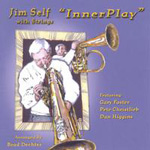Home » Jazz Articles » Album Review » Jim Self: InnerPlay
Jim Self: InnerPlay
The completion of the InnerPlay project took almost five years, including three separate recording sessions that utilized three different rhythm sections, including some of Los Angeles' best players, and the Jay Rosen Strings. I've never been a real fan of the use of strings in a jazz setting. In this case, however, they remain unobtrusive, provide a beautiful coloration for the finished album and are undoubtedly shown to their best advantage by Brad Dechter's arrangements.
Self is just not along for the ride on this album. He is the principal soloist on most of these compositions, placing himself alongside saxophonists Pete Christlieb, Gary Foster and Dan Higgins. The album opens with Herbie Hancock's "Speak Like A Child," where Self's tuba states the melody and supplies a supple solo statement, after which he shares the stage with Dan Higgins' soprano sax. The piece brings back the days when Ray Draper used the instrument in a small late-'50s combo; Howard Johnson did the same thing more recently. Isham Jones' "There Is No Greater Love" comes out of the gate swinging, with Self playing the fluba. The hybrid instrument allows Self to communicate a lightness in his playing, and he shares a solo with Pete Christlieb on tenor sax.
Clare Fischer's jazz standard "Pensativa" sounds more mournful than usual. The tuba melody statement and solo at the high end of the instrument's range, plus the bossa treatment and Gary Foster's flute, all combine to make this tune another highlight. You must prepare yourself for the version of Gershwin's "I Loves You Porgy," though. Undeniably one of the sadder love songs, it begins with a harp intro from Gayle Levant. Self's plays the timeless melody dramatically and then solos, after which the entire ensemble enters to support Christlieb's tenor sax.
There are many other noteworthy moments to look foward to, until the album ends with "Do You Know What It Means To Miss New Orleans." This song, which is usually played at dirge tempo, is led here by the sorrowful presence of the tuba. Whether intended as a tribute to the losses of Hurricane Katrina or not, the performance serves as a sad reminder.
Track Listing
Speak Like A Child; There Is No Greater Love; Pensativa; I Loves You Porgy and Bess You Is My Woman; Cipriana; That Morning in May; The Underdog Has Risen; No More Blues; Strollin'; Do You Know What It Means To Miss New Orleans.
Personnel
Jim Self
tubaJim Self: tuba, fluba; Gary Foster: alto saxophone, bass clarinet, flute, alto flute; Pete Christlieb: tenor saxophone; Dan Higgins: soprano, alto and tenor saxophone, flute; Terry Trotter, Tom Ranier, Mike Lang: piano; Gayle Levant: harp; Jim Fix: acoustic and electric guitars; Tom Warrington, Dave Carpenter, Ken Wild: bass; Steve Houghton, Steve Schaeffer, Ralph Humphrey: drums; John Mangussen: vibes,pecussion; Brian Kilgore: percussion; Brad Dechter: alto sax; Roger Newman: conductor; Jay Rosen Strings.
Album information
Title: InnerPlay | Year Released: 2006 | Record Label: Bassett Hound Records
< Previous
Codebook
Comments
Tags
For the Love of Jazz
 All About Jazz has been a pillar of jazz since 1995, championing it as an art form and, more importantly, supporting the musicians who create it. Our enduring commitment has made "AAJ" one of the most culturally important websites of its kind, read by hundreds of thousands of fans, musicians and industry figures every month.
All About Jazz has been a pillar of jazz since 1995, championing it as an art form and, more importantly, supporting the musicians who create it. Our enduring commitment has made "AAJ" one of the most culturally important websites of its kind, read by hundreds of thousands of fans, musicians and industry figures every month.



















